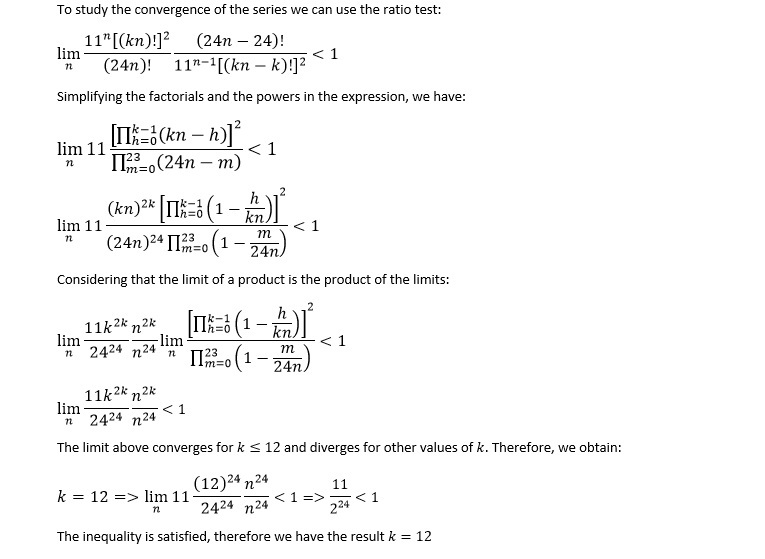Convergence (2)
What is the largest possible such that the series above converges?
Try Convergence (1) if you thought this problem was fun.
The answer is 12.
This section requires Javascript.
You are seeing this because something didn't load right. We suggest you, (a) try
refreshing the page, (b) enabling javascript if it is disabled on your browser and,
finally, (c)
loading the
non-javascript version of this page
. We're sorry about the hassle.

n = 0 ∑ ∞ a n = n = 0 ∑ ∞ ( 2 4 n ) ! 1 1 n ( ( k n ) ! ) 2 = n = 0 ∑ ∞ ( 2 4 n ) 2 4 n + 1 / 2 e − 2 4 n 1 1 n 2 π ( k n ) 2 k n + 1 e − 2 k n Stirling’s formula: n ! ≈ 2 π n n + 1 / 2 e − n
Consider the ratio text, for the sum to converge, we have L = n → ∞ lim ∣ ∣ ∣ ∣ a n a n + 1 ∣ ∣ ∣ ∣ < 1 . Therefore,
L = n → ∞ lim ( 2 4 ( n + 1 ) ) 2 4 ( n + 1 ) + 1 / 2 e − 2 4 ( n + 1 ) 1 1 n + 1 2 π ( k ( n + 1 ) ) 2 k ( n + 1 ) + 1 e − 2 k ( n + 1 ) ⋅ 1 1 n 2 π ( k n ) 2 k n + 1 e − 2 k n ( 2 4 n ) 2 4 n + 1 / 2 e − 2 4 n = ( 2 4 n ) 2 4 e 2 k 1 1 ( k n ) 2 k e 2 4
We note that when k = 1 3 , L → ∞ . For L < 1 , the largest k m a x = 1 2 .
References: